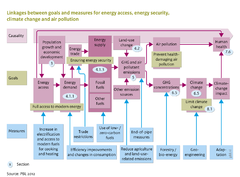Air pollution and energy policies
Parts of Air pollution and energy policies
| Component is implemented in: |
| Related IMAGE components |
| Projects/Applications |
| Key publications |
| References |
Key policy issues
- How do energy policies contribute to economic and social development, and how do they support or hamper a more sustainable future?
- How can the goals for affordable, clean and reliable energy be achieved taking into account possible synergies and trade-offs?
Introduction
Many countries have formulated explicit policies to address the role of the energy system in achieving their development ambitions. These policies are clustered under goals for affordable energy, clean energy, and reliable energy. The EU Energy Strategy, for instance, aims for a competitive, sustainable and secure energy system (EC, 2010). Similarly, the UN Secretary-General Advisory Group on Energy and Climate Change (AGECC) states as goal ensuring reliable, affordable, and sustainable access to modern energy services (AGECC, 2010).
Other energy policies are also pursued. Energy exporting countries, for instance, aim to maximise returns on national fossil-fuel reserves. Many countries have formulated policies to support specific energy uses (e.g. irrigation) or user groups by offering energy at reduced costs, by subsidies or energy taxes exemptions , or by providing free grid connectivity. While inspired by other policy considerations, some of these measures rank as harmful subsidies from an environmental perspective.
The three energy goals represent trade-offs, but also opportunities for synergy, and model studies can help to identify and explore these. An important interaction is also with the climate policies discussed in Component Climate policy.
Here, we focus on access to modern energy sources (affordable), and air pollution reduction (clean) and energy security (reliable). Energy security concerns may limit use of foreign supplies, with possible implications for domestic energy prices and environmental impacts. Access to modern energy generates additional demands for fuel and electricity with benefits for economic development, but may also lead to more energy imports. Outside air pollution from burning fossil fuels may increase, but phasing out traditional bioenergy will substantially reduce indoor air pollution, resulting in net health improvements. Currently, in some regions and cities burning fossil fuels and biomass contributes to severe and increasing levels of air pollution and associated health impacts, see also Component Land and biodiversity policies.
